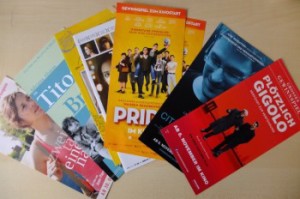I had the idea for this Lesson plan while going to see Pride, a drama about the 1984-84 Miner’s strike in the U.K.
It’s worth seeing for Imelda Staunton and the all-star cast alone!
Uber-busy teachers can download the lesson plan here. Teachee-Filmee.pdf (385 downloads)
Preparation
Take the night off. Relax, you deserve it. Take yourself down to the local cinema and see a film.
While you’re there pick up some leaflets/ flyers for newly-released films. You’ll need a set of leaflets for each pair, three or group of learners.
You decide.
Procedure
1) Tell learners that you went to see a film yesterday/ at the weekend/ whenever. They have to ask you questions to discover what film you saw – they will only get YES/NO answers.
2) Give out flyers to films – one set for each group.
3) Tell learners that they have 5-8 minutes to PLAN the questions they are going to ask. This is an important stage so don’t rush this.
4) Go round, monitor, answer questions and give learners vocab if needed.
5) Learners ask you their questions – you answer ONLY yes or no.
Optional stage: Introduce quiz phrases
You’re getting warmer/ closer
Can we have a clue?
You’re nearly right
You’re miles away (there)
6) Eventually learners will guess your film.
7) Show trailer of film (if you have projector). Would you see this film?
8) Learners play the same game. Write the introductory words that they should use on WB:
I went to see a film yesterday. Can you guess which one?
Learners should start with these words and their partners should ask questions. This way they get to repeat the questions from the round and there’s also some peer learning.
Conclusion
I hope that you liked this lesson – if you use it in class or have any variations then please drop me a line.
Like a lot of my lesson plans this one was inspired by the ‘everyday’ – taking something commonplace and transforming it into a simple lesson.
Do you have any lesson plans from ‘everyday experiences’?
Let me know.
paul

Tried and tested – it worked! Modifications I would make. In stage 3, limit the number of questions learners can ask (depending on level). This makes it more interesting.
Stage 8. It’s obviously more interesting if learners talk about films THEY watched. So in my class tonight my learners just wrote down notes about a film they watched recently (I wrote guiding questions on WB e.g. What kind of film was it?) and then they spoke about this in pairs.